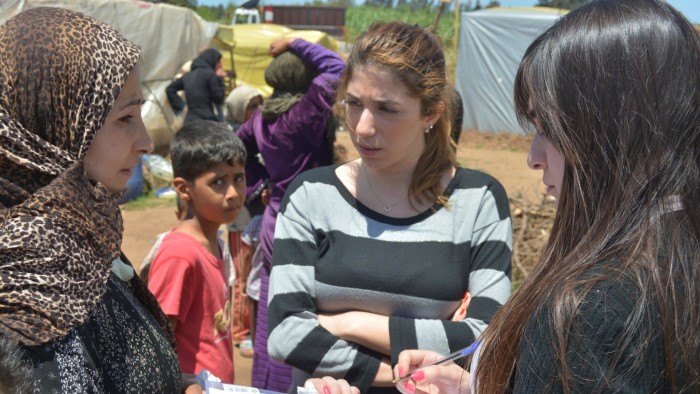Refugee charity seeks to develop disaster relief

Simply sign up to the World myFT Digest -- delivered directly to your inbox.
In the world of emergency responses, cash is the new king. After decades of building vast logistical operations to deliver food, tarpaulins, tents and other supplies to disaster zones increasingly relief agencies have begun to accept that sometimes what the victims really need is just a bit of cash.
But there’s a problem. Even cash takes time. It can take six weeks before agencies can distribute the money to the people who need it — an eternity in the disaster relief world. Could they instead find a way to distribute cash responsibly just a few days after a typhoon or tsunami?
This is just one of the problems the International Rescue Committee, this year’s FT Seasonal Appeal partner, wants to address when it launches a new research and development laboratory in the coming months. The initiative will begin with a core team at the charity’s New York headquarters, backed up by teams in country offices. It hopes the lab’s researchers will find innovative ways to deliver aid and, importantly, do existing things better.
The lab is part of a bigger guiding principle that IRC has been putting to work since 2008. Like many organisations in the disaster relief and development world, IRC is putting a new focus on evaluating its operations and examining their effectiveness.
FT Seasonal Appeal: The International Rescue Committee

The FT has chosen the International Rescue Committee as its partner in the 2014-15 Seasonal Appeal. IRC is a global charity that helps people whose lives and livelihoods have been shattered by conflict and disaster. It works in more than 30 countries to help people survive, recover and gain control over their future.
Read more about the IRC’s work
Economists at places such as MIT’s Abdul Jamil Lateef Poverty Action Lab, known as J-PAL in the development world, have during the past decade been applying rigorous testing to international development programmes to try to determine whether they really work. The efforts have helped challenge many of the accepted orthodoxies in the development world and spurred an occasionally heated debate over what to do about it.
Jeannie Annan, who leads the IRC’s research and evaluation unit, says the charity wants to play a leading role in turning that conversation into one that is relevant to disaster relief as well as longer-term development programmes. Most importantly, it also wants to make sure its research informs the work that IRC does in the field.
“IRC is compelled by the idea that we really need to test what we are doing,” she says. It is a process that is “embedded in everything we do”.
Much of the work is conducted in partnership with researchers at leading universities such as Harvard, MIT and the London School of Economics. Subjects have so far ranged from studies of a few hundred people to larger examinations of thousands of communities. The subjects range from how best to physically rebuild places after disasters strike, to what sort of rice seeds to distribute to farmers in west Africa and how to tackle problems such as chronic malnutrition in Chad and treating pneumonia in northern Uganda.
According to Ms Annan the goal of the IRC’s evaluations is not just to identify what is effective, but also what isn’t. In fact, she says, “it is often more important to publish what doesn’t work”. In a series of reports released in 2014, for example, the IRC built the case for including “positive parenting” programmes in developing countries. Along the Myanmar-Thailand border and also in Liberia, studies found that teaching new parenting skills helped reduce violence against children. The programmes had remarkably different results. In Liberia, teaching non-violent parenting practices over a 10-12 week period led to an almost two-thirds decrease in the beating of children. Along the Thai-Myanmar border a similar programme saw a decrease in beatings of just 18 per cent.
In this year’s World Development Report researchers at the World Bank argued for a wholesale rethink of development policy. For too long, they said, efforts to help the poor had been governed by the view that people operate in a black box, and act as economically rational beings impervious to their surroundings. More focus, the authors wrote, needed to be placed on finding ways to “nudge” — or lure — people into better behaviours by providing greater incentives and rethinking how programmes are designed.
Ms Annan thinks the report is a portent of something greater. “This could be transformational for the field. I think it could really change the way we do things,” she says. It is a change the IRC is determined to remain part of.
*Read all the FT’s seasonal appeal coverage of IRC’s work at ft.com/seasonalappeal
Comments